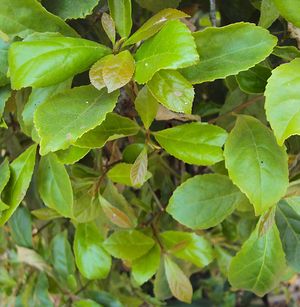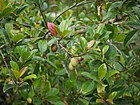Note: This is a project under development. The articles on this wiki are just being initiated and broadly incomplete. You can Help creating new pages.
Difference between revisions of "Elaeocarpus serratus - Aravata"
(→Uses) |
(→Habit) |
||
| Line 33: | Line 33: | ||
==Habit== | ==Habit== | ||
| − | {{Habit|Evergreen | + | {{Habit|Evergreen tree}} |
==Identification== | ==Identification== | ||
Revision as of 17:38, 25 February 2019
Elaeocarpus serratus is a tropical fruit found in the Indian Subcontinent, Indo-China and South East Asia. It is an ornamental medium sized tree indigenous to Sri Lanka, producing smooth, ovoid green fruits.
Contents
- 1 Uses
- 2 Parts Used
- 3 Chemical Composition
- 4 Common names
- 5 Properties
- 6 Habit
- 7 Identification
- 8 List of Ayurvedic medicine in which the herb is used
- 9 Where to get the saplings
- 10 Mode of Propagation
- 11 How to plant/cultivate
- 12 Commonly seen growing in areas
- 13 Photo Gallery
- 14 References
- 15 External Links
Uses
Dandruff, Abscesses, Fungal infections, Joint swelling, Eczema, Perspiration problems.
Parts Used
Chemical Composition
Chemical investigation of the leaves of Elaeocarpus serratus yielded myricitrin (1), mearnsetin 3-O-β-D-glucopyranoside (2), mearnsitrin (3), tamarixetin 3-O-α-L-rhamnopyranoside[1]
Common names
| Language | Common name |
|---|---|
| Kannada | |
| Hindi | |
| Malayalam | |
| Tamil | karai, ulankarai |
| Telugu | |
| Marathi | NA |
| Gujarathi | NA |
| Punjabi | NA |
| Kashmiri | NA |
| Sanskrit | chiribilva- aravata |
| English | Ceylon Olive |
Properties
Reference: Dravya - Substance, Rasa - Taste, Guna - Qualities, Veerya - Potency, Vipaka - Post-digesion effect, Karma - Pharmacological activity, Prabhava - Therepeutics.
Dravya
Rasa
Madhura (Sweet)
Guna
Guru (Heavy), Snigadh (Unctuous), Sneha(Oily)
Veerya
Sheet (Cold)
Vipaka
Madhura (Sweet)
Karma
Vata, Pitta
Prabhava
Rejuvenation,Supplement
Habit
Identification
Leaf
| Kind | Shape | Feature |
|---|---|---|
| simple | spiral | Leaves simple, alternate, spiral, clustered at twig ends |
.[2]
Flower
| Type | Size | Color and composition | Stamen | More information |
|---|---|---|---|---|
| Inflorescence | 2-4cm long | white | Inflorescence racemes; flower petals white, laciniate, anthers ciliate |
Fruit
| Type | Size | Mass | Appearance | Seeds | More information |
|---|---|---|---|---|---|
| 7–10 mm (0.28–0.4 in.) long pome | s | {{{6}}} |
Other features
List of Ayurvedic medicine in which the herb is used
- Vishatinduka Taila as root juice extract
Where to get the saplings
Mode of Propagation
How to plant/cultivate
Members of this genus generally grow well in full sun to moderate shade, requiring a fertile, moist but well-drained soil[3]
Commonly seen growing in areas
Photo Gallery
References
External Links
- Ayurvedic Herbs known to be helpful to treat Dandruff
- Ayurvedic Herbs known to be helpful to treat Abscesses
- Ayurvedic Herbs known to be helpful to treat Fungal infections
- Ayurvedic Herbs known to be helpful to treat Joint swelling
- Ayurvedic Herbs known to be helpful to treat Eczema
- Ayurvedic Herbs known to be helpful to treat Perspiration problems
- Herbs with Root used in medicine
- Herbs with Leaves used in medicine
- Herbs with common name in Tamil
- Herbs with common name in Sanskrit
- Herbs with common name in English
- Habit - Evergreen tree
- Index of Plants which can be propagated by Seeds
- Index of Plants which can be propagated by Cuttings
- Herbs that are commonly seen in the region of Trophical
- Herbs







